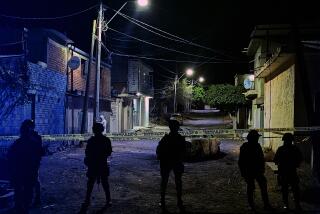In Greece, streets have quieted, but fury remains
In a nation that has long prided itself on public protest, the convulsions of outrage have quieted for the moment. But anger still is simmering in the streets.
Greeks are pledging to keep up strikes and street demonstrations against the government and the austerity measures it passed to secure $146 billion in international bailout cash. Their indignation is rooted not so much in the painful prospect of slashed pensions and salary cuts, which opinion polls indicate will be grudgingly accepted, as in a general sense of betrayal by politicians they regard as having glided through the crisis with impunity.
Three workers died of smoke inhalation last week after demonstrators threw firebombs into a bank in central Athens. One of them was a young woman who reportedly was pregnant. The deaths temporarily stunned the nation and cooled the protests, but organizers say they now are prepared to bring the crowds back into the streets.
“There’s no turning back. We can’t go back,” said Grigoris Iliopoulos, vice chairman of the Confederation of Civil Servants, one of Greece’s two major labor unions. “People will become even angrier when they reach the point where they can’t put food on their tables. Nobody knows to what level the reaction will rise.”
Organizers are planning a demonstration for Wednesday and a nationwide 48-hour strike within weeks, Iliopoulos said.
Beyond the painful household adjustments, Greeks are grappling with thornier issues: the corruption that saturates daily life, the sacrifices made for the sake of the European Union, the government officials who engage in shadowy business deals and lie about the budget.
Anarchists rampage in the streets warning of the perils of globalization and the International Monetary Fund. Pharmacists all over the country strike to protest EU restrictions. The morning paper warns that 100,000 private-sector jobs will soon be lost. The days bring all manner of troubles, vaguely related and ominous.
“When these austerity measures are implemented, there will be complete chaos in Greece,” said Natasha Lekkou, an 18-year-old architecture student. “We’re fed up with the system, with what we’ve gone through all these years. We’re fed up with everything in Greece. And now we’re this close,” she pinched her fingers together, “to everything collapsing.”
Lekkou is a student at Athens Polytechnic, a university referred to by Greeks as their Tiananmen Square: In 1973, the government sent a tank crashing through the gates to quell student protests. Today police are banned from entering the campus, making it an ideal staging ground for demonstrators, and a handy sanctuary for criminals.
The gates are scrawled with anarchy signs and slogans: “Keep warm, burn out the rich,” “Eat the rich,” and “Against everything, for nothing.”
“If we had lost the money, as Greeks, we’d have the maturity to say, ‘OK, we’ll take the measures,’ ” Lekkou said. “But it’s definitely not our fault this time, and so we can’t accept it. That’s why the demonstrations will continue.”
Much of the anger is aimed at politicians. Faced with a public clamoring for high-level repercussions, government officials seem likely to sacrifice some of their own. Both the ruling party and the opposition are in talks about slashing the number of lawmakers. There is also discussion of stripping away the parliamentary immunity that has allowed lawmakers to avoid prosecution in corruption cases.
“People understand, more and more, the privileges and the corruption of the lawmakers,” said Paulina Lampsa, international secretary for the ruling Panhellenic Socialist Movement party, known as PASOK. “And because markets are abstract, it’s easier to be against politicians…. People feel they have not been punished enough.”
As dusk settled over Athens on Tuesday, a small group of demonstrators gathered at the charred storefront where the bank workers died. They dropped flowers onto a growing mound of wilting blooms and milled around somberly before signs denouncing the killers.
The demonstration had been called by a small left-wing party, and so attendance was sparse. This wasn’t one of the big protests, just a fringe event for a few Greeks to vent some of their angst.
“I’m feeling motivated by emotions: sadness, anger, lots of questions,” said Christiana Symeonidou, a 29-year-old college graduate who says she is working at a cafe “for now,” one of Greece’s many underemployed young people. “It’s a combination of what’s happening in the country and the death of these workers.”
The group eventually made its way along the street of shuttered shops and graffiti, chanting about the need to fight, pledging not to bend their heads.
“Some people should go to court, and others should go to prison,” said Konstantina Papadimitriov, 32. “We don’t really know how our life is going to be, and the government isn’t showing that the people who are responsible are going to pay the price.”
More to Read
Start your day right
Sign up for Essential California for news, features and recommendations from the L.A. Times and beyond in your inbox six days a week.
You may occasionally receive promotional content from the Los Angeles Times.






